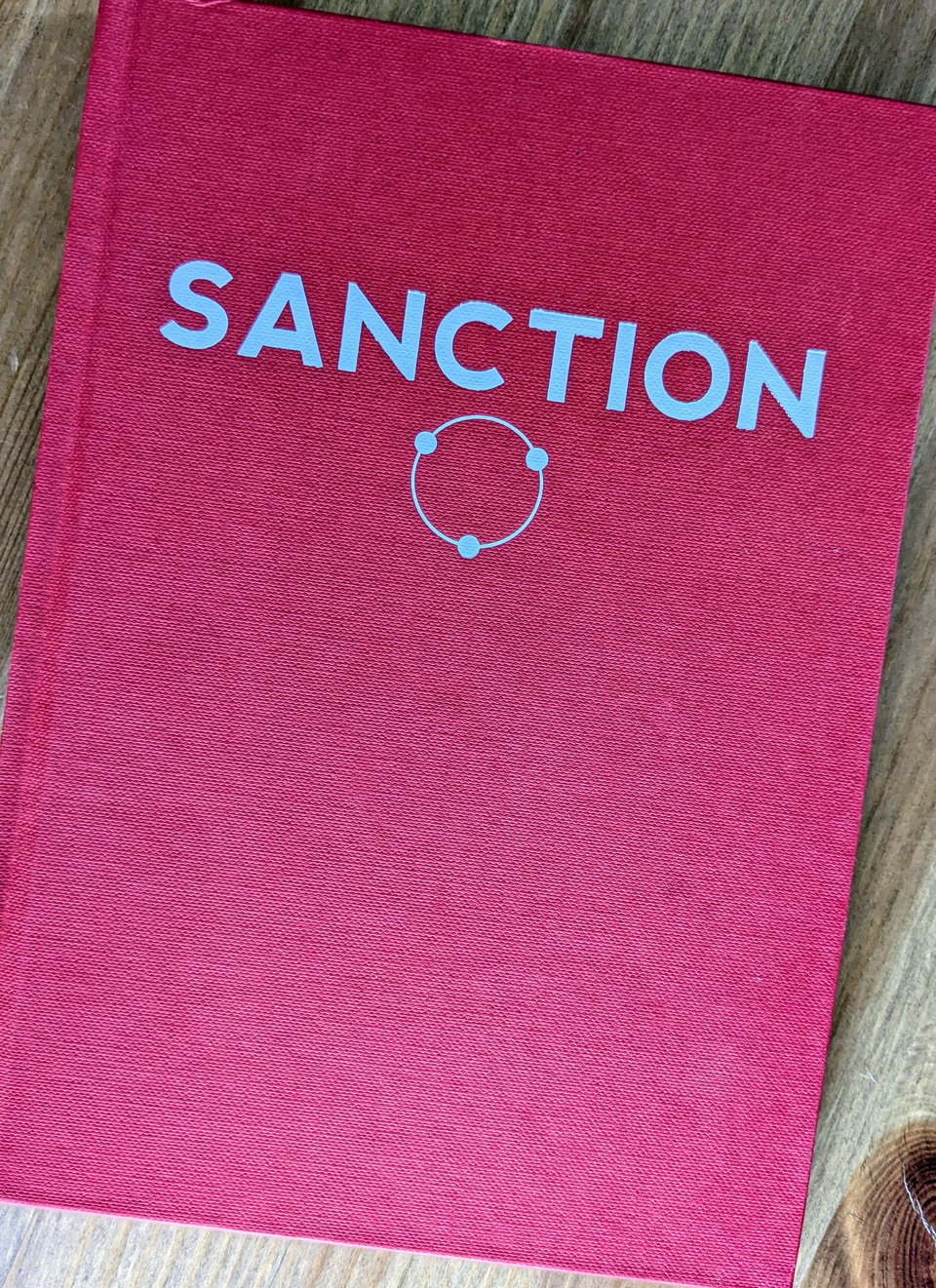Foundry, Sanction, Teeth, but not necessarily in that order.
Welcome to the TEETH newsletter! This is a (mostly) weekly transmission about our adventures in the very secret land of Tabletop Roleplaying-Games. We have published a series of our own TTRPGs! A new book is coming to crowd-funding soon.
What appears within this letter is written and compiled by buckling swash, Jim Rossignol, and keeling haul, Marsh Davies. Come and join us over on the TEETH Discord! Free tooth emojis for everyone.
And hey, if you can wish to support us and also get a fantastic 320-page RPG, you can BUY OUR BOOK, if you aren’t already a member of that rather cool and highly exclusive club, that is. There’s also a whole range of related TEETH RPGs to go along with that.
Hello, You
Links
Sanction
Hello, you.
Look at the pair of us! Fully committed to the occult pirate theme of our forthcoming book, GOLD TEETH.

But don’t worry, Marsh hasn’t really been blasted in twain by a cannonball! And nor is Jim haunted by a monkey (at least not yet) -- these are our author portraits for the forthcoming book. And portraits of pirates is something that we’re going to be talking about a great deal in the coming weeks, as the book’s crowd-funding is now visible on the horizon, even without the aid of a tall mast and a long telescope. In fact, we should have some manner of early announcement for you as early as next week.
In the meantime, though, please enjoy the precious newsletter.
Love,
Marsh & Jim
LINKS
THING OF THE WEEK: Foundry VTT. This isn’t in any way new, but since we’ve been using it lately I wanted to confirm that we have decided we like it best of the VTTs! Consider that to be a TEETH Newsletter Endorsement™. Now then, the rationale: we’ve been playing online weekly since 2020 and during that time we’ve sampled a cross section via both of our regular groups, and although we have not used all (but perhaps a majority of) VTTs available out there, we’re happy to make this our current recommendation. Yes, we have got to the other side of Roll20 (okay, good), PlayRole (quite good), Alchemy (pretty!) as well as using a bunch of other tools, including the stalwart website RollForYourParty on a regular basis. OwlBear Rodeo also looks quite pleasing, but we’ve not used it in anger. Foundry, though, speaks to us on a number of levels. The primary one is you can pay for a single licence and then host it yourself. Now, this might seem a little more complicated than other just-go-to-website implementations, but that little extra layer of control is something that certainly appeals to those of us brought up in The Old Internet, where hosting things and running websites was just what we did. You can pay for hosting elsewhere, of course, so that’s convenient, but just the flexibility there is quite something. Foundry is, as a result, also… a little more fiddly. It’s probably the nerdiest VTT because it requires setup but makes more parameters available to you to tweak and control. If you can stomach that, the rewards are clear. What is more is that the list of supported systems is quite significant. Hell, given the games we tend to run, we now have it set up with the barebones of some d6, a map, and some clocks. But there are far more ambitious implementations available, as we discovered when we played some classic Warhammer stuff quite recently. Foundry supports some marvellous features (such as line of sight on a map) to make miniatures games possible to the point of it feeling disturbingly like a videogame. Also, well…
THERE’S MORE OF THE WEEK: I didn’t talk about Foundry without something of an agenda. Discord member Snowkeep has done the heroic thing and created a TEETH package for Foundry. Playbooks and so forth are all functional, and should support an ongoing game. I think we can all agree that this is a righteous thing to have done, and we thank them for their efforts. There’s also a digital TEETH dice set for Foundry, with teeth by our own Marsh Davies. So if you want to know how best to play TEETH online, well, this is your answer.
Really into the concept of the new Troika book, Get It At Sutlers. “Get It At Sutlers is a tool to add depth and convenience to ongoing campaigns set in the city of Troika. This huge expansion introduces the ability for player-characters to take on dayjobs at the prestigious department store, Sutlers! This can serve as the core for a whole campaign – where players meet endless interesting NPCs and pick up adventure hooks and juicy gossip – or as an as-you-need-it encounter generator for when the party needs a little bit of money to purchase a ticket to their next adventure.”
TEETH-friend Deborah L Davitt’s Kickstarter for Mists & Memory has gone live. “It's a noir game about an agency of cunning anthropomorphic investigators seeking their fortunes—and their memories—on the streets of a city perennially being destroyed and created, that happens to be surrounded by a malevolent Mist.” It also seems to feature their real-life cats as detectives.
Brought to our attention via Comrade Dodds, Plasmodics looks tremendous fun. Contains “guidelines for building mutated and nuanced freaks.” Quite so.
Sanction RPG and a question about system-agnosticism.
Firstly: I just think it’s really neat.
Sanction is a system-agnostic RPG rules set by Paul Baldowski, and I backed it immediately, because I really enjoyed The Dee Sanction, from which it is derived.
So here’s the thing that delights me about this: the concept is that whatever you roll… well, let me quote the Kickstarter text:
“During a session of Sanction, a player handles challenges with a roll against one of three Resources — measured by a dice value for Physical, Mental and Willpower — and hopes to avoid a result of 1 or 2. Whatever the outcome, the character always succeeds in broad terms, but they falter with a result of 1 or 2. A falter means success with fresh consequences. That means even a lousy roll won't stop progress; it just means things might get a bit harder. That's the core, the philosophy that even in failure, the story should always be moving forward, even if it might tilt toward potential disaster in the process!”
But here’s the really neat part: the difficulty of the roll, of avoiding a 1 or 2, is determined by pushing up and down between dice types, from a d4 up to a d12. A player trying something with no expertise or advantage would likely be using a d4, but someone with enormous powers, advantage, expertise all piled up on top of each other in a pyramid of potential? A d12. You step up and down through these dice by collating the resources a character has. It’s a really fun way of approaching things, filled with the sort of negotiation and situation-discussing chatter that my players absolutely love in RPGs. Sure, it doesn’t provide my hit of rolling a fist-full of dice in a pool, but it’s nevertheless just really neat. (And puts my personal favourite dice, the d12, at the top of the stack. Sigh, I love you d12.) [Note: I tried to find a good picture of a d12 to illustrate its nobly faceted demeanour, but found myself instead reading about the mystery of the Roman dodecahedron, which is worth a browse if you’re not familiar with it.]
The book itself, a slim canvas-bound red volume, is one of my favourite titles of recent years: a clever, brief, hackable system, and then some examples of how that hacking might proceed, and how these rules might be applied to different settings.

There’s a bunch more to it than that, of course -- that’s what the book is for! -- but you get the idea.
Secondly, though, what I had been ruminating over was what I could use it for. What could I adapt it to? I am no stranger to playing adaptations of one setting mapped to another ruleset -- one of the most interesting of these was Dark Heresy in the ideographic interpretation system, Genesys, which I was going to link to but am too lazy to trawl through our now voluminous archive for -- and so I am keen to try Sanction out with my group. There are even some settings now available to work directly with the Sanction rules but… I feel like I want to explore it as an exercise in applying a ruleset to an adventure that is intentionally agnostic to setting.
We did this a few years ago with The Vast In The Dark, but even that is skewed towards OSR rulesets. Is there, I was thinking, a setting that comes without such preconceptions? Is there something that comes pre-loaded without rules in mind?
This led me to this question: what would be a “classic” system agnostic adventure that I could run using the Sanction system? And I don’t have an answer to this. I asked a few folks who know better than me, and got a few interesting answers and some links to adventures we absolutely should play a some point, but it seems like there isn’t really a classic of the form. Comrade Gillen even posed a thread about it over on Bluesky, and the answers, and often the way it was answered, was illuminating (of there not really being a good answer.) Regardless, there isn’t an adventure you could point to and say it was the classic one for trying out rule sets on. Which makes sense, given how intertwined these things are.
But it’s not going to stop me, and I continue to research the idea. And I am going to ask that question here: if I run Sanction with my group, what adventure or setting should I go for? Why? Yes, I should probably run one of those adventures created for it, or I could write something myself, but that defeats my arbitrary purpose! I don’t often pose a question on the newsletter, but I really would like some opinions on this one. There’s a comments system here, or you can come let us know what you think over on the TEETH Discord.
-jim
More soon! x
Add a comment: